
It Is hard sometimes to keep the focus on families versus individuals in the face of women, men, children, youth. They all had their fair share of awareness-raising around issues and needs. Other than International Day of Families on 15 May families, as units, get very little coverage, even though they are the basic unit and community of society. Yet all these other categories of people have an intrinsic family aspect. “No man (or woman) is an island” is a well-known saying and it is one of my guiding beliefs, that individualism is a societal problem. Individuality is different and it is good from a young age to allow family members to develop their own identity and personality. However according to Albert Nolan in Jesus Today individualism, as one of the signs of the time today, is destructive and its effects include loneliness, alienation and an inability to maintain relationships.
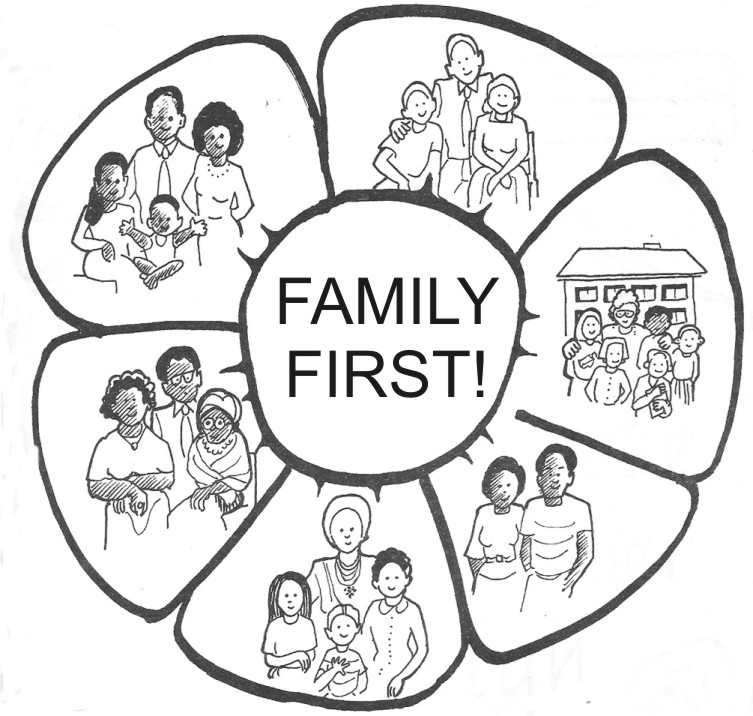
With a family focus one does not deny that abuse of women and children happens to them, but it happens within any kind of family unit, especially if the perpetrator is also a family member. Even if abuse occurs by an outsider the abused person and the rest of her family are affected.
It is a source of frustration for me and other like-minded thinkers in the SA Social Development Family Services Forum, Sekwele and other family organisations that 16 days like Women’s Day, Men’s Day, Children’s and Youth Days are not being addressed meaningfully from a context of a family. Even a single mom’s abuse by her boyfriend has an impact on her children. Men, who most often – but not always – are the abusers are members of families; boyfriends, husbands, brothers and sons. Even mature men – the “blessers” who have relationships with young girls are usually family men. Men may be protected by family members and so it becomes impossible to have the problem addressed. President Ramaphosa’s Emergency Response Action Plan on GBV is to be rolled out.
In South Africa 16 DAYS OF ACTIVISM has Gender-Based Violence as its theme. 16 DAYS is an international initiative sponsored by UN and its dedicated focus is on informal women workers whose lives and livehoods have been acutely impacted by Covid-19. The ILO reports that 60% of the world’s employed earn their living in the informal economy. 92% of working women in developing countries are informally employed as, for example, domestic workers, home-based workers, street vendors, agricultural workers, waste-pickers and sex workers.

Both of the above themes warrant attention at this time. Some underlying reasons for the issues are inequality, disempowerment of women, oppression and patriarchy as historical but unacceptable today. Clearly if any of the social ills is not addressed with the whole family unit or, certainly the man-woman relationship in mind, resolution is unlikely. Inequality is a particular example that needs wider exploration. As women become more empowered, are happily independent, and men may be feeling angry and disempowered, violence is hardly a surprise. Pope Francis acknowledges the reality in Amoris Laetitia and agrees that women’s empowerment is good in itself. However, the effect on a family unit as a whole and on children with these new roles and functioning needs to be noted. Is some of the dysfunctionality of modern families related to greater equality and these changing roles.
16 DAYS should certainly look into gbv as being promoted through the President’s strategic plan for women, but going further, let us put energy into dealing with mutual empowerment, building healthy self-esteem as individuals but within a context of relationships.
MARFAM 2020 theme OUR WORLD A FAMILY OF FAMILIES has focused on FAMILY ENDINGS IN November and December’s theme is FAMILY – HOPE FOR THE FUTURE. During these next 16 days, as we move into Advent, a time to prepare for Christmas, growing family spirituality can be a helpful and hopeful resource.
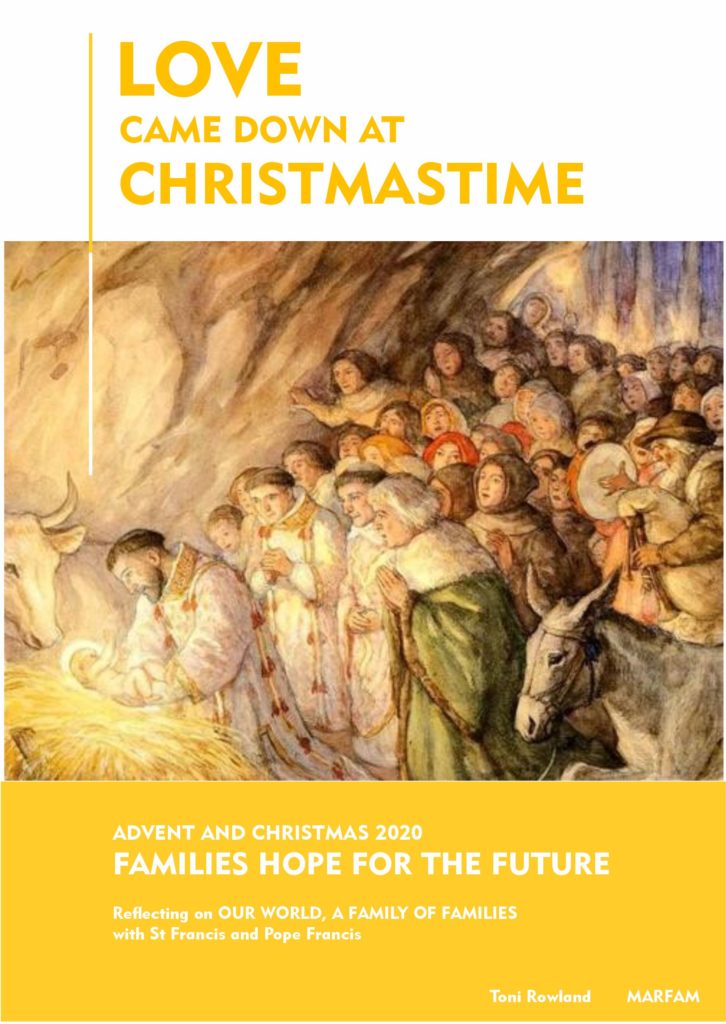
LOVE CAME DOWN AT CHRISTMASTIME, our Advent-Christmas programme unpacks the story of God’s love from Creation to Incarnation as experienced by St Francis and his companion St Clare. Their spirituality has been brought to light by Pope Francis. We reflect on God’s care for all his creatures, each seen as brothers and sisters by St Francis. “Everything is connected,” Pope Francis writes. In Laudato Si’ he presents creation and then in Fratelli Tutti a human level. His work is particularly relevant at this time of climate change, poverty and social inequality. The concept of fraternity, being brothers and sisters is central and if this doesn’t start in the home, what chance is there of getting it right on a societal level?
REFLECTIONS.
November 26. Groups discussed the so-called last things which came up a lot in the readings of the time. “In almost every generation there are people who believe the end of the world is nigh. We call that millennialism. Some people interpret the book of Revelation and speak about The Rapture, when those who have lived righteous lives will get taken straight up into heaven. Some Biblical books are written from that perspective. Climate change is obvious in all parts of the world and governments and private agencies in the secular world are recognizing the negative effects on weather patterns; hurricanes, typhoons, cyclones, floods and droughts. Whether the end is nigh or not, more must be done by everyone including families on a holistical level, with the awareness of Our World, A Family of Families. Jesus himself told us that only the Father knows the end. Does that give you hope and comfort or not?
And there will be signs in sun and moon and stars, and upon the earth distress of nations in perplexity. Luke 21: 20-28. Pope Francis: Patriarch Bartholomew has drawn attention to the ethical and spiritual roots of environmental problems which require that we look for solutions not only in technology but in a change of humanity; otherwise we would be dealing merely with symptoms. LS 9
November 27. Was Jesus a lover of nature? He used birds, seeds, plants and trees in his teaching and parables, recognising and valuing these ordinary natural parts of life. When pets die we and our children often feel very sad. There was a time when it was taught that animals do not have a soul. Nowadays our thinking about creation has changed. We comfort our children with the message that they will see Fluffy the cat, or Munchkin the hamster again as we teach them about the process of life and death. Watching the growth cycles of plants and flowers too reminds us of the fact that life is a journey towards eternity and that all of creation will be glorified.
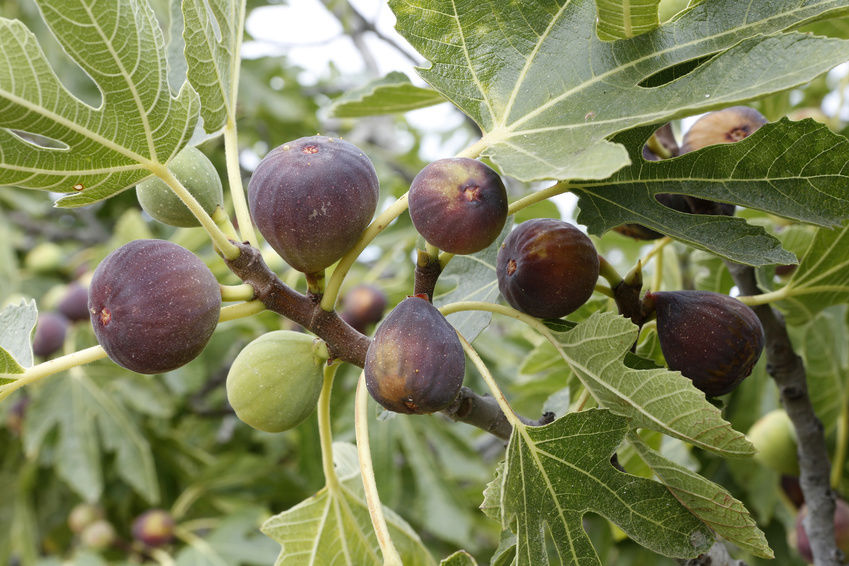
Look at the fig tree and all the trees; as soon as they come out in leaf know the summer is near. Luke 21:29-33. Pope Francis: St Francis takes us to the heart of what it is to be human. Just as happens when we fall in love whenever he would gaze at the sun, the moon or the smallest of animals he burst into song, drawing all other creatures into his praise. His response to the world around him was much more than intellectual appreciation for to him each and every creature was a sister united to him by bonds of affection. Rather than a problem to be solved, the world is a joyful mystery to be contemplated with gladness and praise. LS11-12.
November 28. Don’t Drink and Drive. Two young teenagers Mapule and George stood at the side of the highway all afternoon as the holiday season was approaching, “ We beg you, please don’t drink and drive” was written on the board they carried. “Last week we were a happy family. Today we are orphans. We don’t want your children to suffer like us.” Patrick saw them standing there looking forlorn and lost and made a mental note to himself, “remember to arrange designated drivers when we have our staff party next month.” Then he stopped and asked them about their experience and to offer help.
Take heed to yourselves lest your hearts be weighed down with dissipation and drunkenness and cares of this life and that day will come upon you suddenly like a snare. Luke 21:34-36 Pope Francis: No one can cultivate a sober and satisfying life without being at peace with him or herself. An adequate understanding of spirituality consists in filling out what we mean by peace and a balanced lifestyle together with a capacity for wonder which takes us to a deeper understanding of life. LS225.
November 29. 1st Sunday of Advent 1B. Advent 1B. “Did St Francis really see the baby Jesus on Christmas night in 1223, 800 years ago?” Michelle asked her mom. “That must have been amazing, like a miracle. Nearly like when I wake up on Christmas morning and find that baby Jesus has arrived in our crib.” “St Francis saw Jesus in everyone and everything,” she answered.” We’re going to think about that this Advent.” Using the thinking of St Francis presented today by Pope Francis in LAUDATO SI and FRATELLI TUTTI, his recent letters to the Church and the world, Mrs Adams was hoping that this Christmas would be unlike any other, just as the year 2020 had been like no other year. Her study of the idea of the World as a Family of Families, with all its many facets had been a challenge as well as a source of enrichment and joy.
At that time Jesus said to his disciples: ”Take heed, watch, pray for you do not know when the time will come.” Mark 13:33. Pope Francis: Saint Francis is the example par excellence of care for the vulnerable and of an integral ecology lived out joyfully and authentically. He was particularly concern for God’s creation and for the poor and the outcast. He loved and was deeply loved for his joy and lived in simplicity and in wonderful harmony with God. LS 10. For Reflection and Sharing. Ideally as a family begin to read and share on stories of the life of St Francis and how they apply to us today.





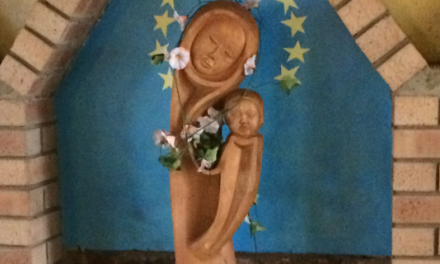


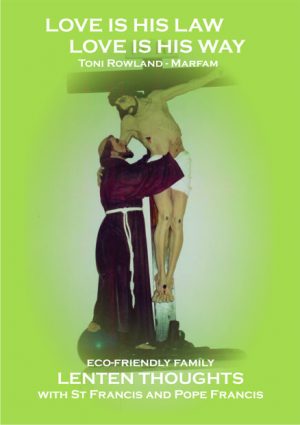
Recent Comments